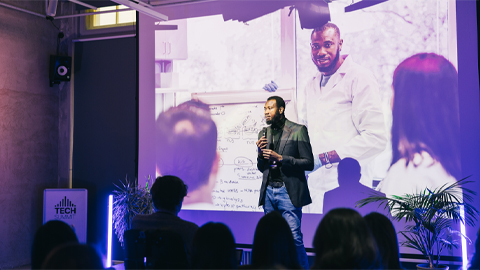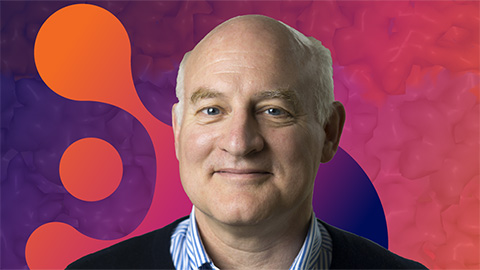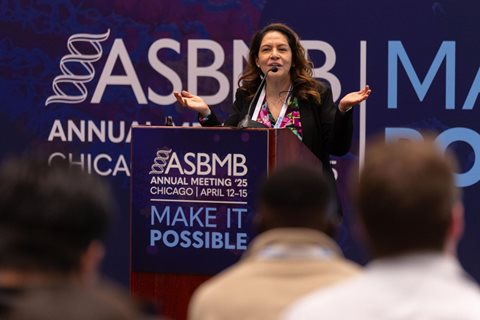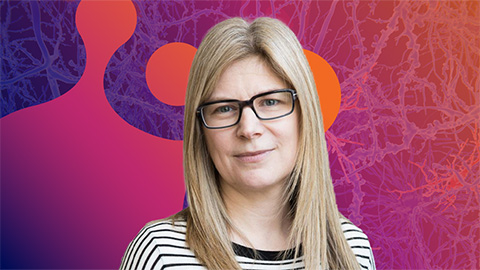Barriers to public outreach — and why scientists need to overcome them
I first entered the world of public science communication in March 2020. COVID-19 was dominating the news and misinformation was everywhere. I felt a responsibility to help my family and friends access understandable information. Pretty soon people were asking to share my posts, and this motivated me to form an official account to reach more people.
If someone had told me then that in 2024 I’d be educating over 30,000 people on science topics via social media, I would have thought they were crazy. However, my experience has helped me realize that this work is an essential part of what it means to be a scientist.

And it’s more important now than ever. A year ago, the Pew Research Center released a report indicating that Americans' trust in scientists and favorable views of science are declining. This is coupled with a growing global anti-science movement that is particularly evident in areas such as vaccination, health information and climate change. Tangible societal and individual consequences include the resurgence of vaccine-preventable diseases and disbelief in climate change.
Numerous scientists, myself included, encourage our colleagues to engage and communicate with the public. To make this happen, the scientific community must address the barriers some scientists face when they consider public engagement.
When I began to research why some scientists were hesitant to do this work, four main themes emerged.
Concerns about perception. Some scientists are afraid of being perceived by their peers as seeking fame or as less skilled or productive in their lab work. Contrary to these concerns, research indicates that engaging with the public can yield numerous benefits including finding a common language with other disciplines, networking and helping scientists be more active academically.
Lack of institutional support. Universities and other institutions often do not prioritize or recognize public engagement in promotion or tenure considerations, nor do they always provide the necessary support and resources for faculty who want to engage with the public.
Time constraints. If institutions do not value public engagement in promotion and tenure processes, scientists may struggle to allocate time for such activities among their already numerous responsibilities.
Lack of confidence and training. Some scientists may be interested in engaging with the public but feel unsure of where to begin or how to approach these conversations. They may not know the best practices for public engagement to make their efforts most effective.
Once these barriers are identified, we can work to address them. For instance, teaching public engagement in undergraduate, graduate and postdoctoral programs can help reshape perceptions of this work and help us emphasize its crucial role. We can incorporate public communication and outreach training into the curriculum to provide students with the skills they need to effectively engage with the public. This can help foster a culture in which such work is seen as integral to scientific practice.
Furthermore, university administrators or members of promotion and tenure committees can advocate for faculty engagement in public outreach. They can recognize these efforts as significant contributions to scholarship and service rather than ancillary activities. Faculty members could then prioritize public engagement without seeing this work as detracting from their other responsibilities.
None of these changes are easy, but this work is important. The COVID-19 pandemic showed us how the impact of science extends beyond the laboratory. Public perceptions of scientific issues directly affect individual health, societal attitudes and behaviors. This includes support for and funding of scientific research.
By talking to the public about our work, we can help rebuild a society that acknowledges the significance of science in everyday life and ensures that everyone has access to the information we need for informed decision-making.
ASBMB Science Outreach and Communication Grant
The American Society for Biochemistry and Molecular Biology aims to increase public appreciation for and understanding of science by promoting science outreach events that encourage interactions between scientists and the community. The memberwide outreach award facilitates the involvement of our members in public-engagement activities that foster the appreciation of science — particularly biochemistry and molecular biology — in informal settings.
During each grant cycle, we offer up to five grants of at most $1,000 each to encourage new or the enhancement of existing science outreach and communication activities. The grants should be used to increase public appreciation of biochemistry and molecular biology or related disciplines.
Applications for 2025 are being accepted through Oct. 25. Apply now.
Enjoy reading ASBMB Today?
Become a member to receive the print edition four times a year and the digital edition monthly.
Learn moreFeatured jobs
from the ASBMB career center
Get the latest from ASBMB Today
Enter your email address, and we’ll send you a weekly email with recent articles, interviews and more.
Latest in Careers
Careers highlights or most popular articles

Upcoming opportunities
Calling all biochemistry and molecular biology educators! Share your teaching experiences and insights in ASBMB Today’s essay series. Submit your essay or pitch by Jan. 15, 2026.

Defining a ‘crucial gatekeeper’ of lipid metabolism
George Carman receives the Herbert Tabor Research Award at the ASBMB Annual Meeting, March 7–10, just outside of Washington, D.C.

Building the blueprint to block HIV
Wesley Sundquist will present his work on the HIV capsid and revolutionary drug, Lenacapavir, at the ASBMB Annual Meeting, March 7–10, in Maryland.

Upcoming opportunities
Present your research alongside other outstanding scientists. The #ASBMB26 late-breaking abstract deadline is Jan. 15.

Designing life’s building blocks with AI
Tanja Kortemme, a professor at the University of California, San Francisco, will discuss her research using computational biology to engineer proteins at the 2026 ASBMB Annual Meeting.

Upcoming opportunities
#ASBMB26 late-breaking abstract submission opens on December 8. Register by Jan. 15 to get the early rate on our Annual Meeting.

